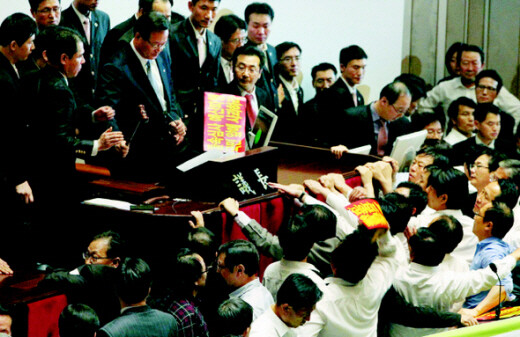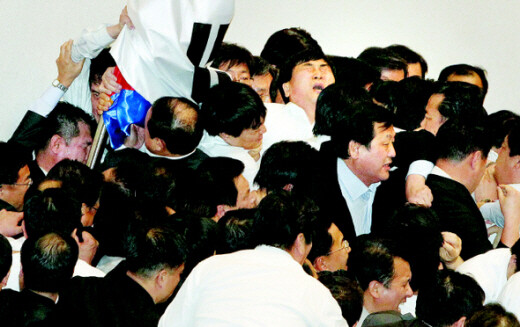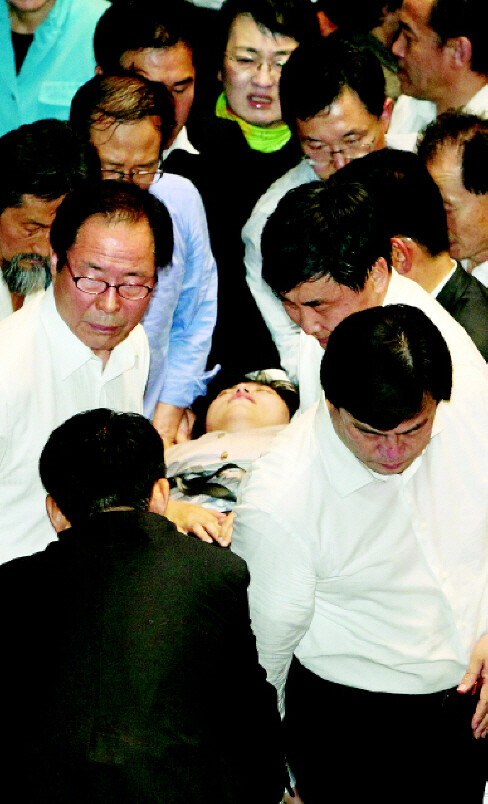hankyoreh
Links to other country sites 다른 나라 사이트 링크
GNP railroads bills for budget, troop deployment and corporatizing universities



By Song Ho-jin
The ruling Grand National Party convened a plenary session of the National Assembly to railroad through the 309.1 trillion Won ($271 billion) budget for 2010 on Wednesday, with opposition party members forcibly removed from their position around the speaker’s seat by the ruling party. Following an intense brawl with opposition party officials and aides blocking the entry to the parliamentary hall that afternoon, the Grand National Party (GNP) broke through and railroaded the budget.
The party also railroaded other controversial legislation after requesting that Speaker Park Hee-tae exercise his authority to present it before the assembly. This included a motion to deploy soldiers to the United Arab Emirates, an agreement connected to South Korea securing a nuclear power plant contract; a special law on the use of hydrophilic zones, which has been criticized as offering preferential treatment to the Korea Water Resources Corporation as a reward for taking on construction for the Four Major Rivers Restoration Project; and a law on the establishment and operation of Seoul National University, the “SNU corporatization law” that critics worry will compromise the public nature of a national university.
Democratic Party Chairman Soh Hak-kyu announced the beginning of a battle against the Lee administration.
“We can no longer call them the Lee Myung-bak administration,” Sohn said. “They are the Lee Myung-bak dictatorship, it’s a coup d’etat that is destroying the National Assembly and democracy.”
Democratic Labor Party Chairwoman Lee Jung-hee said, “This sort of outrageous anti-democratic behavior from the Lee Myung-bak administration is a patent declaration of all-out war against the people of South Korea.”
The GNP placed great significance on the fact that it set a precedent for passing the budget within the National Assembly’s regular session.
“We will pass it today, accepting any criticisms that come our way, in order to break the practice of year-end budget railroading,” said GNP floor leader Kim Moo-sung Wednesday morning, indicating the supreme significance placed on “passing the budget within the regular session.”
However, by employing rash measures to railroad the budget plan through based on a timing rationale, the ruling party severely compromised the budget review function that is the authority of the National Assembly. Some within the GNP also questioned the need for rushing the budget through.
The GNP unilaterally declined to attend a bipartisan figure adjustment subcommittee meeting, calling it an “opposition party stalling tactic.”
Also unusual is the fact that the GNP, rather than seeking a harmonious solution through discussions with the opposition party, instead employed railroading procedures after unilaterally notifying the opposition of the closing time for figure adjustment subcommittee and special committee on budget and accounts activity, placing paramount value on “passing the budget within the regular session.”
In the ten years since 2001, efforts have been made to seek bipartisan agreement, even when it meant calling an extraordinary session of the National Assembly in December. When the budget was railroaded through, the ruling party chose a time when public criticism of the delayed passage was at a peak.
During the seven-year period between 2001, under the Kim Dae-jung administration, and 2007, when the Roh Moo-hyun administration came to an end, ruling and opposition parties passed budget plans by bipartisan consensus a full six times, putting passage off under just before the New Year. Only in 2005, when the GNP refused to even review it in protest of an amendment to the Private School Act, did the ruling party railroad the budget, and even then it was passed on Dec. 30.
In particular, critics charge that by bundling the budget with contentious legislation on which public opinion is sharply divided, including the UAE deployment, the GNP undermined its own justification of passing the budget within the regular session.
A GNP lawmaker from the greater Seoul area said, “I do not understand why they added in controversial legislation where there has not yet been sufficient discussion, when their argument is about passing the budget during the regular session.”
A number of conclusions have emerged within the ruling party to account for this immoderate decision.
Observers were unanimous that floor leader Kim Moo-sung’s distrust of the opposition was a major factor.
“Kim Moo-sung has put up with a lot already,” said a key figure in the floor leader’s office. “But he determined that he could no longer trust [Democratic Party] floor leader Park Jie-won and took action.”
But many observers also say that this was an inevitable decision from a ruling party floor leader lacking discretionary power and a weak-willed National Assembly speaker, acting according to President Lee, who is determined to finish the Four Major Rivers Restoration Project within his term, and adamant about passing the 2011 budget within the regular session.
“President Lee has stated on numerous occasions that the budget needed to be passed during the regular session,” said a GNP member of the National Assembly’s strategy and finance committee. “For a speaker and floor leader from the ruling party, it would have been impossible to go against this.”
Another GNP lawmaker with the Budget and Accounts Committee said, “We were prepared to decide on the scale of cuts from the Four Major Rivers Restoration Project budget through talks between the ruling and opposition party floor leaders, and to accept a certain amount of extension of the budget review deadline.”
“But Kim Moo-sung would not have been able to offer an alternative that would satisfy the opposition, which is calling for cuts to the Four Major Rivers Restoration Project budget in the trillions of Won,” the lawmaker added.
Indeed, a number of budgets and account committee members within the GNP reportedly told the DP that only about 300 billion Won could be cut from the Four Major Rivers budget at the level of that committee, and that the remainder was up to Kim.
Meanwhile, GNP Lawmaker Lee Hahn-koo, who has consistently opposed the railroading of the Four Major Rivers Restoration Budget, and former GNP chairwoman Park Keun-hye abstained from voting, citing “minor health issues.”
Please direct questions or comments to [englishhani@hani.co.kr]
Editorial・opinion
![[Column] Park Geun-hye déjà vu in Yoon Suk-yeol [Column] Park Geun-hye déjà vu in Yoon Suk-yeol](https://flexible.img.hani.co.kr/flexible/normal/500/300/imgdb/original/2024/0424/651713945113788.jpg) [Column] Park Geun-hye déjà vu in Yoon Suk-yeol
[Column] Park Geun-hye déjà vu in Yoon Suk-yeol![[Editorial] New weight of N. Korea’s nuclear threats makes dialogue all the more urgent [Editorial] New weight of N. Korea’s nuclear threats makes dialogue all the more urgent](https://flexible.img.hani.co.kr/flexible/normal/500/300/imgdb/original/2024/0424/7317139454662664.jpg) [Editorial] New weight of N. Korea’s nuclear threats makes dialogue all the more urgent
[Editorial] New weight of N. Korea’s nuclear threats makes dialogue all the more urgent- [Guest essay] The real reason Korea’s new right wants to dub Rhee a founding father
- [Column] ‘Choson’: Is it time we start referring to N. Korea in its own terms?
- [Editorial] Japan’s rewriting of history with Korea has gone too far
- [Column] The president’s questionable capacity for dialogue
- [Column] Are chaebol firms just pizza pies for families to divvy up as they please?
- [Column] Has Korea, too, crossed the Rubicon on China?
- [Correspondent’s column] In Japan’s alliance with US, echoes of its past alliances with UK
- [Editorial] Does Yoon think the Korean public is wrong?
Most viewed articles
- 1‘We must say no’: Seoul defense chief on Korean, USFK involvement in hypothetical Taiwan crisis
- 2N. Korean delegation’s trip to Iran shows how Pyongyang is leveraging ties with Moscow
- 3Amnesty notes ‘erosion’ of freedom of expression in Korea in annual human rights report
- 4‘Weddingflation’ breaks the bank for Korean couples-to-be
- 5[Reportage] On US campuses, student risk arrest as they call for divestment from Israel
- 6[Column] Park Geun-hye déjà vu in Yoon Suk-yeol
- 7Korea sees more deaths than births for 52nd consecutive month in February
- 8[Editorial] New weight of N. Korea’s nuclear threats makes dialogue all the more urgent
- 9Will NewJeans end up collateral damage in internal feud at K-pop juggernaut Hybe?
- 10[Guest essay] The real reason Korea’s new right wants to dub Rhee a founding father